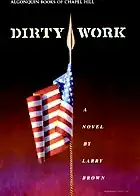Dirty Work (Brown novel)
Dirty Work is the debut novel of American writer Larry Brown. It was originally published in 1989 by Algonquin Books, and went on to receive the Mississippi Institute of Arts and Letters Award for fiction. Also in 1989, USA Today included it on their annual list of best works of fiction published during the year.[2]
 1st ed. (hardcover) dustjacket | |
| Author | Larry Brown |
|---|---|
| Cover artist | Glennray Tutor[1] |
| Country | USA |
| Language | English |
| Genre | Fiction |
| Publisher | Algonquin Books |
| Awards | Mississippi Institute of Arts and Letters Award |
| ISBN | 9780945575207 |
| OCLC | 19388439 |
Background
Although Dirty Work has been called a “Vietnam War novel,” Brown stated that his intention in writing Dirty Work was:
“to write a book that was more about the aftermath of the war and the damage that was inflicted on two soldiers more than the actual war itself. I wanted to show not so much what happened to them then, but what is happening to them now.”[3]
Brown graduated from high school in 1969 and joined the Marine Corps in 1970 —during the Vietnam War— but was not deployed. [4] After Dirty Work was published, Brown was often asked about how he wrote a book from the viewpoint of disabled veterans. In an interview with Kay Bonetti, Brown said that
“The guys in Dirty Work are actually based on some of the Marines that I met in the early ’70’s in Philadelphia where I was stationed–guys who were in wheelchairs, who had lost their arms and legs and had made that great sacrifice too. . . The novel is all a work of fiction that comes from my being so impressed by these guys that I met.”[3]
Brown’s biographer states that Brown wanted “to write about the after-effects of the war … largely because his father was deeply damaged by his four years in the infantry during World War II.”[5] Besides Brown’s father, Knox Brown, recounting his own painful memories serving in World War II,[3] Brown remembered listening to veterans who had served in Vietnam telling their own stories in the North Carolina bars Brown went to while he was in the service.[6]
So at some point, Brown admits: “I knew everything I needed to know about the weapons from my training, and I’d talked to enough marines who were in combat to find out what it was like over there. That’s all you need. You just invent the rest.”[3]
Plot summary
The novel takes place over the course of a day and a night —a period of less than two days— in a VA hospital.[7] Walter James, a white veteran of the Vietnam war, has just been admitted.[7] His face was completely reconstructed after he suffered severe wounds. As a result of a fragment of bullet embedded in his brain, James also suffers blackouts and dizziness.
He meets Braiden Chaney, a black man who lost both of his arms and legs from gunfire in the Vietnam War.[7] He has been in the VA hospital for 22 years.[7] The novel is structured in a stream of consciousness style, much of it taking place within Braiden's mind. He constructs elaborate fantasies, most of which involve his being a king in Africa, to escape the plight of his physical state.
Most of the novel consists of dialogue between the two men. They tell each other their respective stories, mostly during the course of one night, while they drink beer and smoke pot that Braiden's sister has smuggled into the hospital for him.
Themes
The novel is ultimately a theodicy, as it attempts to explain the paradox of evil in a world created by an omnipotent God. Braiden has several conversations with Jesus during the novel. The reader is left to determine whether they are fantasies or real conversations, the novel implies that they are real.
The plot of the novel borrows from One Flew Over the Cuckoo's Nest, which is referred to in the novel. Braiden, along with his sister, eventually convince Walter to kill him. He has wanted to end his life for years. The novel concludes with this event, and Walter reflects, "I knew that somewhere Jesus wept."
References
- Cash, Jean W. (2011). Larry Brown: A Writer's Life. Jackson, MS: University Press of Mississippi. p. 88. ISBN 978-1-60473-980-0.
- Dede, Yow (2000), Boyd (ed.), Columbia Companion to the Twentieth-Century American Short Story, New York, NY: Columbia University Press, pp. 172–175
- "Larry Brown, Mississippi writer of Dirty Work…from Oxford". www.mswritersandmusicians.com.
- Watson, Jay (July 10, 2017). "Brown, Larry". Mississippi Encyclopedia. Retrieved October 26, 2023.
- Cash, Jean W. (2011). Larry Brown: A Writer's Life. Jackson, MS: University Press of Mississippi. p. 88. ISBN 978-1-60473-980-0.
- Dede, Yow (2000), Columbia Companion to the Twentieth-Century American Short Story, New York, NY: Columbia University Press, pp. 172–175
- "Dirty Work by Larry Brown | Hachette Book Group". Algonquin Books. October 26, 2023. ISBN 9781565125636. Archived from the original on 2023-10-26.